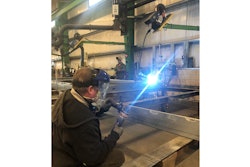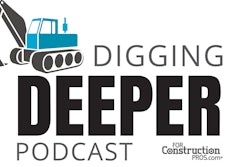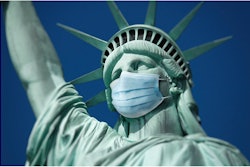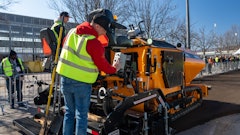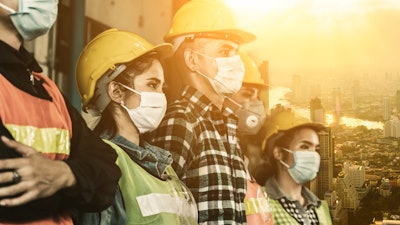
The Cybersecurity and Infrastructure Security Agency (CISA) collaborated with public and private industry to create an “Essential Critical Infrastructure Workforce” advisory list. (CISA executes the U.S. Secretary of Homeland Security’s authorities to secure critical infrastructure.) The list is intended to help state, local, tribal and territorial officials as they work to protect their communities, while ensuring continuity of functions critical to public health and safety, as well as economic and national security.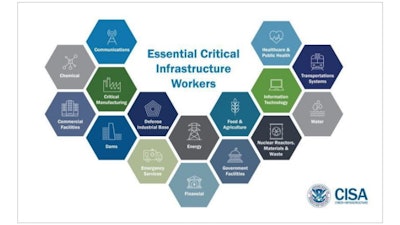 Cybersecurity and Infrastructure Security Agency, US Department of of Homeland Security
Cybersecurity and Infrastructure Security Agency, US Department of of Homeland Security
“Federal officials have, wisely, heeded our advice and opted to release new guidance that makes it clear that construction activities are included in its list of essential critical infrastructure workers," said chief executive officer of the Associated General Contractors of America, Stephen E. Sandherr. "This new federal guidance should help eliminate the confusion and ambiguity that has led several state and local officials to needlessly order halts to construction activity that is clearly essential.
“Specifically, federal officials have opted to identify construction and related activities, including the manufacture and delivery of construction supplies and safety equipment and the permitting and inspection of projects, in 25 different parts of its guidelines, compared to four times in its prior iteration. That is because federal officials understand the essential role construction plays in supporting our critical infrastructure and economic activities. They also understand that construction activity can continue to occur in a way that protects workers and the general public from the spread of coronavirus."
State, local, tribal, and territorial governments are responsible for implementing emergency response, including decisions about access and reentry, in their communities, while the federal government is in a supporting role. Officials use their own judgment in directing emergency response and guidance. Similarly, critical infrastructure owners and operators are expected to follow relevant public health guidance and use their own judgement when prioritizing business processes and allocating workforce to continue delivery of essential goods and services. All decisions should balance public safety, the health and safety of the workforce, and continued delivery of essential critical infrastructure services and functions.
Homeland Security intends the list to help public officials and employers identify essential work functions, and it allows for the reality that some workers whose activity is identified as “essential” may be unable to perform those functions because of health concerns.
CISA will continue to work with the critical infrastructure community to update the advisory list if necessary as the nation’s response to COVID-19 evolves. If you have questions about this list, contact CISA at [email protected].
The advisory doesn’t name construction independently as an essential critical infrastructure industry, but mentions construction, maintenance and repair as part of several of the 16 industries those industries. It’s a long list, but here are some construction highlights:
- Workers that ensure continuation of maintenance and construction, including issuing permits and inspections for construction supporting essential infrastructure.
- Workers who support necessary credentialing, vetting and licensing operations for critical infrastructure workers.
- Workers performing housing construction related activities to ensure additional units can be made available to combat the nation’s existing housing supply shortage.
- Workers supporting the construction of housing, including those supporting government functions related to the building and development process, such as inspections, permitting and plan review services that can be modified to protect the public health, but fundamentally should continue and serve the construction of housing (e.g., allow qualified private third-party inspections in case of government shutdown).
- Workers supporting the energy sector through renewable energy infrastructure (including, but not limited to wind, solar, biomass, hydrogen, ocean, geothermal, and/or hydroelectric), including those supporting construction, manufacturing, transportation, permitting, operation/maintenance, monitoring, and logistics.
- Providing services related to energy sector fuels (including, but not limited, petroleum (crude oil), natural gas, propane, natural gas liquids, other liquid fuels, nuclear, and coal), supporting the mining, processing, manufacturing, construction, logistics, transportation, permitting, operation/maintenance, security, waste disposal and storage, and monitoring of support for resources.
- Manufacturing and distribution of equipment, supplies, and parts necessary to maintain production, maintenance, restoration, and service at energy sector facilities (across all energy sector segments).
- Workers including truck drivers, railroad employees and contractors, maintenance crew, and cleaners supporting transportation of chemicals, hazardous, medical, and waste materials to support critical infrastructure, capabilities, functions, and services, including specialized carriers, crane and rigging industry workers.
- Workers who support the operation, inspection, and maintenance of essential public works facilities and operations, including bridges, water and sewer main breaks, fleet maintenance personnel, construction of critical or strategic infrastructure, traffic signal maintenance, emergency location services for buried utilities, maintenance of digital systems infrastructure supporting public works operations, and other emergent issues.
- Workers such as plumbers, electricians, exterminators, builders, contractors, HVAC Technicians, landscapers, and other service providers who provide services that are necessary to maintaining the safety, sanitation, and essential operation of residences, businesses and buildings such as hospitals, senior living facilities, any temporary construction required to support COVID-19 response.
- Workers who support, such as road and line clearing, to ensure the availability of and access to needed facilities, transportation, energy and communications.
- Support to ensure the effective removal, storage, and disposal of residential and commercial solid waste and hazardous waste, including landfill operations.
- Workers who support the operation, inspection, and maintenance of essential dams, locks and levees.
- Engineers, technicians and associated personnel responsible for infrastructure construction and restoration, including contractors for construction and engineering of fiber optic cables, buried conduit, small cells, other wireless facilities, and other communications sector-related infrastructure. This includes construction of new facilities and deployment of new technology as these are required to address congestion or customer usage due to unprecedented use of remote services.
- Suppliers, designers, transporters and other workers supporting the manufacture, distribution and provision and construction of essential global, national and local infrastructure for computing services (including cloud computing services and telework capabilities), business infrastructure, financial transactions/services, web-based services, and critical manufacturing.
- Workers supporting essential maintenance, manufacturing, design, operation, inspection, security, and construction for essential products, services, and supply chain and COVID 19 relief efforts.
- Workers who support the supply chain of building materials from production through application/installation, including cabinetry, fixtures, doors, cement, hardware, plumbing, electrical, heating/cooling, refrigeration, appliances, paint/coatings, and employees who provide services that enable repair materials and equipment for essential functions.
- Workers distributing, servicing, repairing, installing residential and commercial HVAC systems, boilers, furnaces and other heating, cooling, refrigeration, and ventilation equipment.
(read the complete text of the Essential Critical Infrastructure Workforce advisory list . . . )




